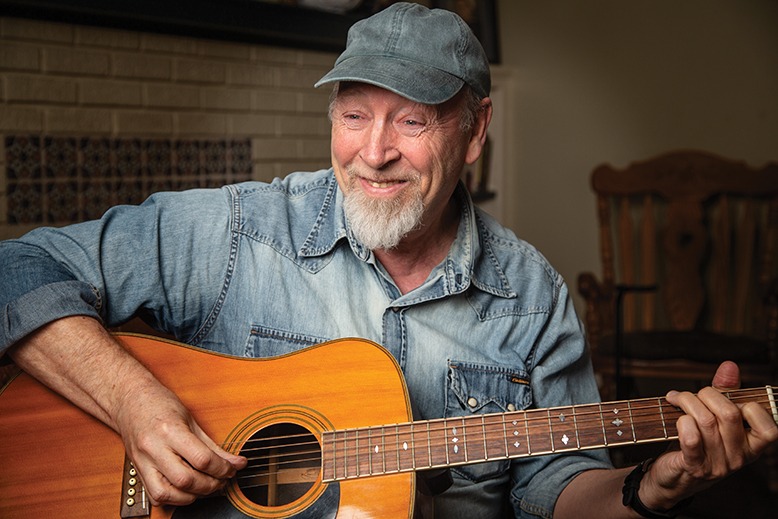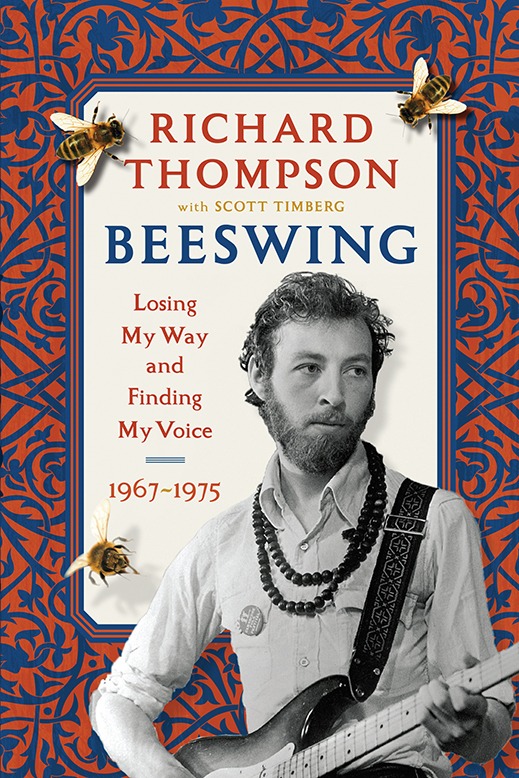
Richard Thompson explores his early years as a genre-busting musician in his new memoir. Courtesy of Best Friend Photography
Richard Thompson has always been hard to pigeonhole as a musician, but the London-born singer/songwriter/guitarist is having no trouble fitting into his adopted New Jersey hometown.
“Montclair is lovely; in many ways, picturesque,” says the 72-year-old guitar virtuoso, who remains active as a recording and performing artist—and lately, an author. On this day, he’s calling via Zoom to help promote his new memoir, Beeswing: Losing My Way and Finding My Voice, 1967-1975 (Algonquin Books of Chapel Hill).
The book—like much of Thompson’s best songwriting—is spare, sharply descriptive and filled with vivid characters. He takes us from growing up in tattered postwar London to his early attempts at music and the rapid emergence of Fairport Convention, the British folk-revival band he helped form in 1967. For the aficionado, there’s plenty of insider discussion of guitars and recording techniques; for the fan, there’s chatter about the stars who crossed Thompson’s path. While still a teen, he peered into a recording studio where Mick Jagger and Keith Richards were doing overdubs for “Sympathy for the Devil.” He jammed in clubs with Jimi Hendrix and Led Zeppelin, and sneaked a backstage peek at Joni Mitchell’s songwriting notebook.
Most British bands of the period drew inspiration from American blues and R&B; Thompson and his Fairport Convention mates were moved by American and Canadian folk artists. He names Tom Paxton, Richard Fariña, Phil Ochs, Leonard Cohen and, of course, Bob Dylan, as influences. “Fairport was always interested in lyrics,” he tells me. Eventually, the band veered away from American sources and pioneered a form of British folk revivalism. “What we did with Fairport,” he proudly states, “was something new.”
But invention is not always the mother of success, and Thompson—who later recorded and toured with then wife Linda Thompson and as a solo artist—has often found himself “on the margins of popular music,” as he writes in the book.
[RELATED: A Conversation with Songwriter Jimmy Webb]
 “I’ve always tried to put the music first,” he says. “When I was more successful, I was happy with that. During tougher times, I just had to tighten my belt.”
“I’ve always tried to put the music first,” he says. “When I was more successful, I was happy with that. During tougher times, I just had to tighten my belt.”
Although Thompson has had a long and storied career—and says his audience continues to grow—his memoir spans only from his late teens to his early 20s. “I love that decade, especially in terms of music,” he says. Oddly, the book is named for a song, “Beeswing,” that did not appear until the 1994 album Mirror Blue.” But, he explains, the song’s footloose characters are emblematic of the period covered by the book. The book and the song, he says, “look back to certain attitudes and lifestyle choices in the ’60s.”
Thompson’s current lifestyle choice—New Jersey—resulted from a chance meeting with singer/author/playwright Zara Phillips four years ago backstage at a concert in Princeton. Phillips, also a Londoner, was already living in Montclair. They became an item—and occasional performing partners.
Although there would be much ground to cover, Thompson is adamant that there won’t be a sequel to Beeswing. (“I might jump straight to volume six,” he jokes.) Rather, he’s eager to get back in front of post-pandemic audiences and looks forward to recording a new studio album later this year. Among his upcoming shows, both solo acoustic: a June 23 Woodbridge Wednesdays concert at Woodbridge High School with Phillips opening (free); and a June 28 set at the Ocean City Music Pier on a bill with Judy Collins.



